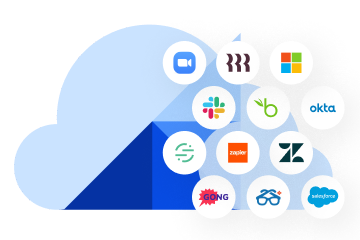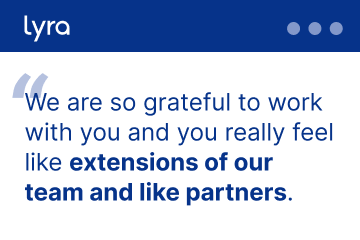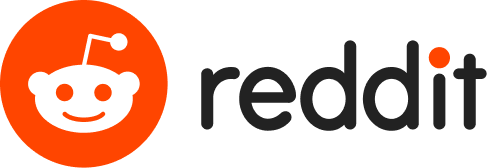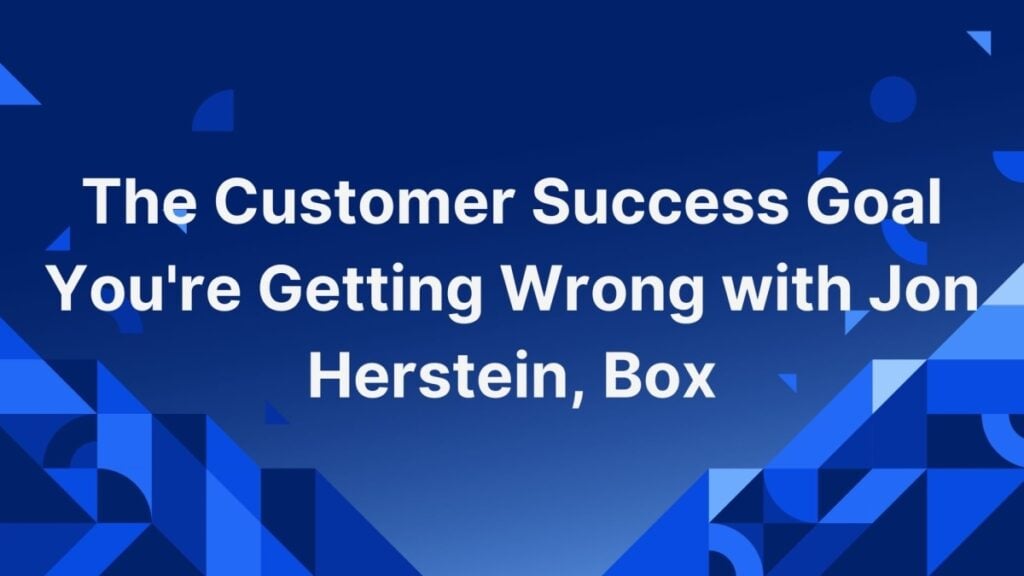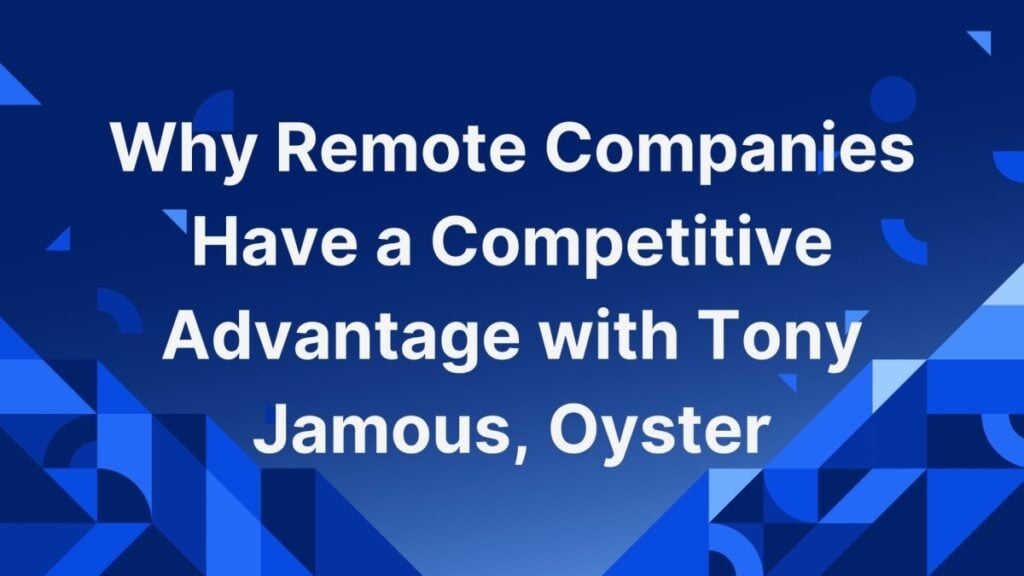-
 Resource Center
Resource Center
Discover enablement best practices and more in our resource center.
-
 Blog
Blog
Read the latest on enablement, learning and training trends.
-
 Podcast
Podcast
LEARN from the top leaders in SaaS.
-
 Videos
Videos
Watch videos and gain actionable insights from leading experts.
LEARN with John Schoenstein, CRO at Sprout Social
2X CRO John Schoenstein, now CRO at Sprout Social, joins us for the latest episode of LEARN. Hear the lessons that have shaped his leadership style after working for some of the biggest tech names and what it takes to lead the Revenue team as CRO at a public company.
"It's easy at a public company to get stuck in circular conversations where people are admiring the problem and not moving forward and solving the problem. The CRO needs to play a role in moving beyond admiring and solving and more into execution."
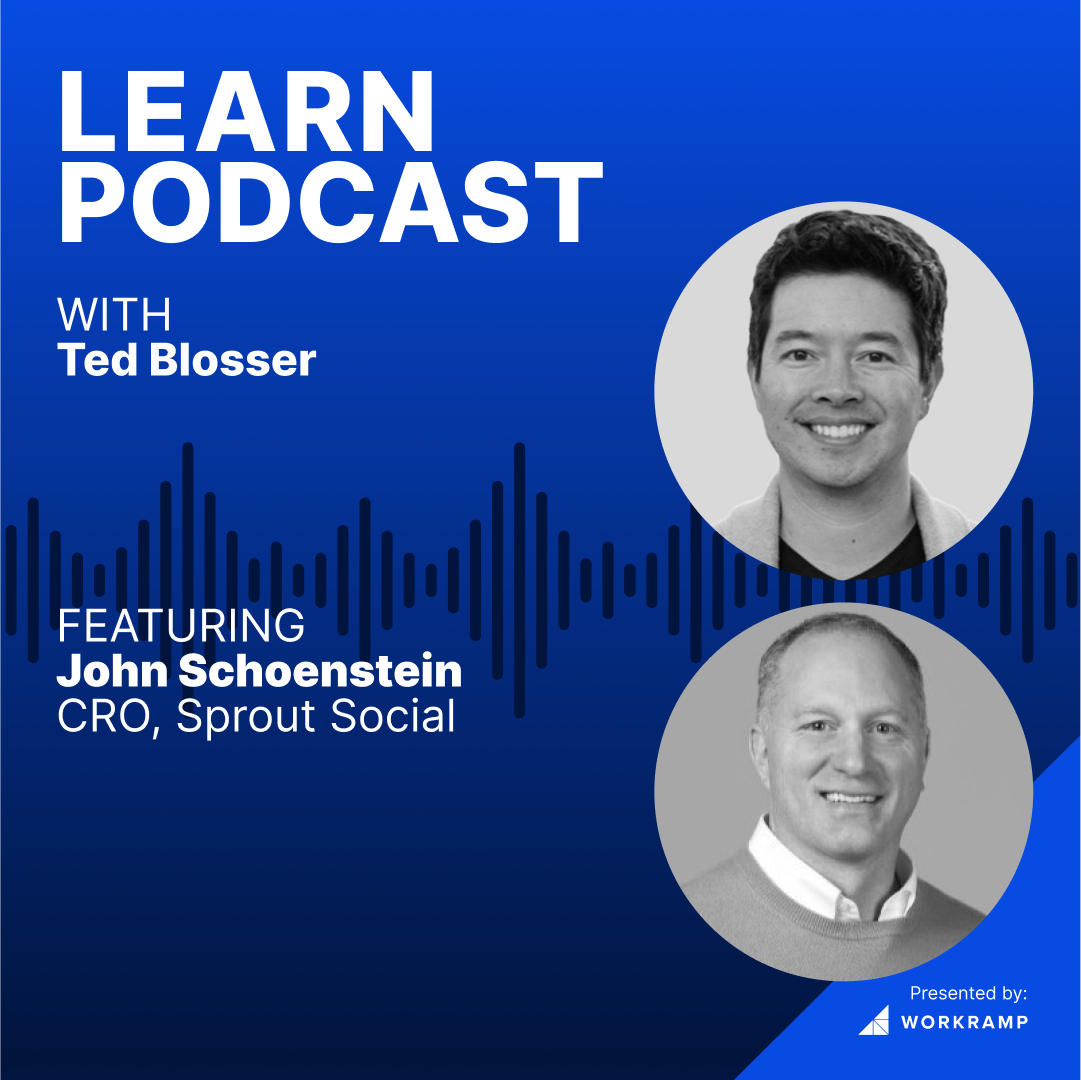
Tune in to hear more about John Schoenstein's not-so-linear career path to public-company CRO (spoiler, he had an impactful stint in Sales Enablement). From Midmarket orgs to IPOs and beyond, John has seen it all.
He’ll also discuss:
-
Why it's essential to adopt a culture of curiosity to accelerate learning and growth
-
How his leadership philosophy anchors on coaching people to reach their full potential
-
How he walks the walk when it comes to customer-centricity
And much more.
Show Timestamps
00:49 - Intro and John's career journey background
06:22 - Customer centricity
08:21 - Microsoft and training enablement
12:57 - Leadership framework
18:16 - What CROs must do at a public company
21:17 - Forecasting insights
22:59 - Rapid-fire segment
Resources
Book recommendations:
- Multipliers by Liz Wiseman
- Essentialism by Greg Mckeown
Transcript
John Schoenstein: It's easy at a public company to get stuck in circular conversations where, you know, people are kind of admiring the problem and not moving forward in the solving the problem. And I think the CRO needs to play a role in moving beyond admiring that problem and, and solve and moving it into execution.
Ted Blosser: Hi, I'm Ted Blosser, CEO and co-founder of Work Ramp, where we're redefining the corporate learning space with the world's first all-in-one learning cloud for employee and customer learning. Welcome to the Learn podcast, where we learn from the biggest leaders in SaaS and hear what makes them successful. Today we have an inspiring leader on, John Schoenstein, CRO of Sprout Social. Thanks for joining us.
Welcome back to the Learn podcast. We have a great guest on with us today, John Schoenstein, theCRO out at Sprout Social, also a workaround customer. So John, thank you for being a great customer. Excited to dive into it today with you. John, let's start with this. Give us a little bit about your background, quick Cliff notes on your background. I'm also gonna ask one interesting fact many people may not know about you.
John Schoenstein: You got it. Sounds great Ted. Thanks so much for having me here. Great to be here. Appreciate the opportunity. Yeah, just a quick, quick background. Grew up in the Bay Area spent some time in different parts of the, of the world. Did a little bit of traveling right outta college. And then from there, went ahead and started working at Oracle and started as an sdr. Started kind of in sales at the beginning and worked my way up through the ranks. Spent about 11 years with Oracle. The last seven years that I was with Oracle, I was based down in Santiago, Chile managing a big part of the Latin America territory selling applications and some services, education services and professional services. From there moved over back up to the states and took a role at Microsoft, a fascinating role.
Got to spend some time there doing a global role, but it was all around sales enablement, which was super fun and interesting. From there, went over to Amazon where I built a couple teams. One was an account management team that was really focused on bringing third-party resellers onto the Amazon platform, and then also led and built and led a an Amazon payments sales organization. From there, went over to eBay briefly, I was there for about a year. And from there ended up going over to Adobe, where I spent about three years leading a big part of their sales organization, selling in the creative cloud and the document cloud for the Americas. And from there went over to SurveyMonkey, where I spent about five years. That was a really fun experience. I helped build a team from about 10 sales people to about 600 or so. Wow. customer success and salespeople over five years. Got to go on the the journey with them of going public, which was, was a really fun process. And then just recently came over to Sprout Social where I've been for about four or five months now.
Ted Blosser: That's awesome. Such a cool background. But let me, let me ask you this. You had such a storied background and when I was researching your background, you went from I would call very big company to not so big company, but still pretty large organizations. And given this in Learning podcast, I'm really curious I remember Adam Grant talking about unlearning, and so I'm curious, what did you learn from the big organizations that you have taken with you to companies like Sprout Social Now, even Momentum, that's called the, the smaller companies, even though they're pretty large? And also what are some of the things you have to unlearn? You're like, you know what, I don't wanna take that from Oracle over here into my leadership role at Sprout. So gimme a, gimme a flavor of both great learnings and unlearning you're trying to have.
John Schoenstein: Yeah, you bet. I, and I love that idea of unlearning, by the way. That's, I that's awesome. So yeah, you know, I feel very lucky, very fortunate to have started my career at Oracle. Great company. I think what I learned there was a lot of, it was sort of like getting an MBA in sales starting there as an SDR and working my way up through the leadership ranks. You learn a lot of discipline and a lot of structure around how to organize a sales team, build the go to market, and then how to really work with customers. I think Oracle really, really ingrained in me the importance of customer centricity, customer obsession, and just making sure that you're constantly focused on delighting the customer. And I've always found that I took that with me and everywhere I've gone, I think when you focus on delighting the customer, good things happen.
You, you, you end up building a lot of trust with those customers and they often can become you know, very long-term customers. And that definitely is one of the great things I think I learned from Oracle as I've gone, like you mentioned, going from larger organizations to and companies to smaller. I think one of the things I had to kind of unlearn was the kind of dependency on other teams around you. So like, you know, where at, at Oracle, for example, we had a large analytics team and I would basically get a lot of reporting from that team that I could then review and then take action on. And I think going to smaller companies, you, you kind of have to create those reports and almost anticipate you have to
Ted Blosser: Dust off your Salesforce chops
ohn Schoenstein: Absolutely, absolutely. And it actually, I like that process actually a lot better because I found when you, when you work through the process of understanding what data you really need, you build the reporting yourself or with, you know, your team and then you review it, like it becomes a lot more sticky and part of the culture and the team really embraces that content and, and those and, and those metrics that you're measuring and it becomes a really core and central to the culture of that team. So while it might not be, you know, it might be a little harder work to go through that whole process, I think ultimately it, it makes you stronger as a team.
Ted Blosser: Let me ask you this, I remember reading the Larry Elson book sophomores, I think that's what it was called. And, he talks a lot about his customer centricity. Do you have a story and this to be any part of your career where you felt like, hey, you've brought in some really good customer centricity, and it could be even with Sprout Now or Momentum, whether it's like a maybe a churn risk customer or something really great you did with a customer. Anything that's top of mind so we can kind of really understand at a tactical level what an example is of customer centricity?
John Schoenstein: I'd say a couple comes to mind. I would probably refer to maybe one that was while I was in Latin America. So this was a customer, I was based in Santiago, Chile, but managing the Latin America territory. So there was a customer in Mexico and it was a paint customer large customer that we were trying to land and it was a ma one of the biggest deals that we were gonna land that year. Yeah. So I flew out to Mexico, spent some time with them, I speak Spanish. And so I think it, they appreciated the fact that I was doing that and not just trying to come in with my approach and telling that, not really treating them as a customer, but more treating them as a partner. I think that resonated with them a lot and really the way that we frame the demo that we did and talked about how we were gonna work with them both pre and post-sales, I think it really resonated with them because the demo was all about helping to bring their colors to life, which was of course very important to them as a paint company, that sort of thing.
Yeah. But they appreciated the custom approach that we took and also really appreciated how we talked about how we were gonna be there with them years after they signed with us and not just like when we got the signature and then we're out of there. Right. So that sort of customer life cycle conversation really resonated with them. So I think the kind of meeting them on their terms, in their language, talking about their business in a way they could understand resonated pretty well.
Ted Blosser: That reminds me of Jason Lemkin who wrote a post, Hey, go fly out to all your customers, meet them in person. I think he said he never lost any of his customers at EcoSign that he flew out to. So it reminds me of, so get on the plane, go meet those customers, I'm gonna cherry pick a portion of your career in work ramp. We sell a lot to enablement buyers. And you had this stint at Microsoft, which sometimes people say, Hey, this is, this could be a nail in the coffin of your career sh for your career trajectory to go from let's say, carrying a bag over to enablement and training, but you did it and you've now come out on the other side even faster in terms of your executive level position. Since tell us about this four-year stint at Microsoft and training enablement. What was going through your head at that time? Was it a last-ditch effort to stay there? What was it? And why did you choose it? Tell us more. I'm sure a lot of people in the crowd are, are interested in it.
John Schoenstein: Yeah, for sure. No, I, I had a wonderful experience with Microsoft, you know, great company. I think also it hit at a certain point in my, in my life where I had two small daughters at the time wanted to make sure I had some time off the road where I could spend with them and really be engaged in their life. And, and previously I'd been traveling quite a bit when I was in that role in Latin America. It was a great role, but I was traveling probably, you know, maybe 50 to 70% of the time depending on the seasonality of the year. And I really wanted to be there with my family and my kids as they were growing up. So this role kind of allowed me to slow down a little bit. We moved up to the Washington area where Microsoft is headquartered and then I was able to really spend a lot of quality time with other sales leaders at Microsoft.
And I think one of the great things that I took away from that experience was just the leadership, the focus that Microsoft puts on leadership is second to none. And I really soaked that up, learned a lot, and I got to spend a lot of time with those sales leaders and in different, in some, in different geographies. I would do a little bit of travel, but it was more like 10 to 15% of my time. So again, quality time with the family, but I also have a curiosity to always be wanting to learn more and new things. And I knew I had learned a lot about sales at Oracle, but I also wanted to understand more from the way Microsoft does it. And I got the opportunity also to build out this sales academy together with other sales leaders at Microsoft that was for all of the Microsoft employees, but also for their resellers. So I got to learn a lot about channel sales, which I think expanded my horizons a bit
Ted Blosser: That way. So I'm putting you back in the time machine, if you remember going back to then, was there something flaw of training leaders, enablement leaders, didn't carry it back, they actually came up through the ranks, maybe they carried it back for a little bit and then Rosa ranks on enablement. Anything that you thought was unique in that, in your approach, whether it's, hey, I I actually jumped onto deals with reps and that was much different or a different methodology maybe you brought from Oracle, but anything you remember if you j jumped back in the time machine that made you successful those four years?
John Schoenstein: Yeah, for sure. I think it really resonated with the team at Microsoft that I had spent 11 years at Oracle carrying a bag and kind of going up through the ranks and paying my dues as it were, right? And going following a similar path as those folks that I think got me instant credibility to be able to really meet them on their own terms. And we sort of spoke a shorthand language, common language together, having that shared experience. I also did a lot of demos and sort of like demos of how to do the pitch in the different segments and the different products that we had and that sort of thing. And I think people could see genuinely that was something I had experience with and I wasn't like, it wasn't like I didn't have sales experience trying to be an enablement leader. It was more I was one of them who was trying to help them and help our partners at Microsoft to, to be as effective as possible. And so I think that credibility sort of broke down walls immediately and allowed me to build a tight relationship with those folks and sort of a trusted relationship cuz they could see that I had that experience. And so it's interesting, I was sharing a lot of my experience with them, but I was also learning at the same time, which was really fun.
Ted Blosser: That's awesome. You have one of the most stellar resumes in terms of Microsoft, Oracle, Amazon, so impressive. I'm actually going to talk a little bit more about your leadership principles. People love learning from others and hey, what are the ways they approach leadership? Our VP of marketing, Jack Foster, who you worked with at Momentum, so thanks for allowing us to take her from momentum. She's been doing a great job and she said, Hey, John is one of the best people managers I know. He knows how to get the most out of people on his team. Give us your framework or your philosophy on leadership. You can go almost anywhere with this, but I'm super curious about your leadership framework.
John Schoenstein: Yeah, thanks Ted. So first of all, Jack is awesome. I'm such a huge fan of Jack Foster, she's amazing. She's a huge part of the success that we had at SurveyMonkey Momentum. I would say, first of all, I've really tried to observe great leaders throughout my career and, and tried to emulate them probably and pick up pieces that, that I saw that I really respected and appreciated. I think my leadership approach is, is aligned with a book that I read when I was, it was probably seven or eight years ago called Multipliers. It's a book that was written by Liz Wiseman also had the opportunity to work with Liz when I was at Oracle. And she was one of the best leaders that I ever I had ever seen. So she created this whole philosophy around what's called multipliers. And so the idea is that as a leader, if you can have a multiplying effect around you, which is essentially bringing the best out of your team, hiring great talent, and then helping them to really reach their potential and get the best out of them around you, it requires really clear communication. You're gonna challenge those folks, you're gonna probably push them a little further, feels comfortable, but it's often that kind of idea of, I know this has been true in my case as well, where you're actually capable of doing more than you may think you are. And sometimes you just need to hear that from someone else. And that encouragement often usually resonates with people on my leadership team. And so yeah, I try to set them up for success and then create space to let, let those folks shine
Ted Blosser: From a sales lens. I love love that philosophy of essentially, it's kinda like the Andy Grow philosophy is like, Hey, you're the output of your team, you need to raise everybody up. Now if you put like a sales lens on this, can you maybe get one level more specific of how do you raise, let's just call a closing accountant executive, right? That's Sprout Social, let's just take that as an example. How do you uplevel them? Is it, is it more coaching, is it more enablement? What is it? Or is it just, hey, I'm gonna jump on calls with them to show 'em how it's done. Mm-Hmm. <affirmative>, what is it that that, if you had to get a little more specific that you would actually do today to help multiply your immediate team? And you're not on the front lines. I'm sure you have managers of managers doing it, but I'm curious that what you suggest.
John Schoenstein: Yeah, great question. So I think it really depends on the person, right? So in the same way that a coach would coach their team, they're gonna coach each individual slightly different than the other because how you motivate someone, it, it's, it's very unique usually to the individual. But what I generally try to do is definitely show the team what I mean. So I love getting on calls, absolutely love getting on calls. I probably spend a good 30% of my time on customer calls and reaching out to prospects and going on site and visiting those customers and that sort of thing. I just get a lot of energy from that and I really enjoy it. I like building those relationships and I try to show and demonstrate the best practices that I've learned and been taught over my career. So I think if it's a more junior salesperson, that's probably what I would do is show them what I'm talking about and, and then talk about where I think they might have opportunity to take a different approach or build a stronger relationship with a customer.
I think also, you know, sometimes it's just being really clear about what expectations that you have for, for those, for the sales leaders that you're leading and the, and the individual contributors as well, making sure they understand that like, look, this is a results-driven organization. So that's sort of table stakes, like, we're here because we are here to drive the result, but how we do it, I'd, I'd much rather take a positive approach to doing that and, and nurture and coach and develop that, that rep or that sales leader as opposed to beating him down, right? Because I think I've seen that approach, the fear approach and it might get you a quarter's worth of results or maybe a couple quarters, but it's very short term. It creates a culture that's usually pretty negative and fear-based. And I, I just don't subscribe to that at all. I kind of steer 180 degrees opposite of that and try to create a culture where people feel that it's a place they can learn, it's a place they can grow, and that we work together as a team to help develop each other, which kind of floats all boats up.
Ted Blosser: I love that philosophy, I love that philosophy especially, I was just coming off we were doing performance reviews here at Work Ramp, we were talking about that how do you balance instilling objective metrics but also building the team up and not leading through a culture of fear. And so love that you're practicing that. Let me shift gears to a really fun topic that very few people are I think even able to answer except for people like you who I would call it, you're at the top of the, the C Mountain, right? You're two times c r o of public companies now and currently serving as the CRO of a public company. And one thing that Nick Meta had turned me on from Gaines site, he's like, Hey Ted, go listen to I listen, literally listened to earnings calls now because I aspire to be a public company CEO one day. And so I'm on there listening. So just to learn, so this question is around being a public company cro, what's the number one or even two things that you would want to give people advice on of being a good public company? CRO could be anything. Very curious. What is top of mind for you?
John Schoenstein: Yeah, that's great. I think there's a couple things I'd probably call out. One, forecasting is critical, so making sure that you're tight on your forecast, making sure that guidance that you're giving is clear, transparent, accurate. That's like so critical. And so it almost goes without saying, but I want to say it anyway because what it really means is you, you, when you are able to do that and do that well, that's a clear demonstration that you're on top of your business and you understand what's happening and where you need to focus and so forth. But that's one you kind of have to make sure you get right. For sure. Another thing I would say is I think it's the CROs role to push the team to reach its potential. And I know that sounds a little cliche maybe, but I tend to think of my role as one who I'm gonna push as hard as I can without breaking anything or, or any people, but do it in a, in a, in a, in a positive productive way where we are always challenging ourselves to do a little better.
So we have this, this phrase at Sprout Social, which is better, better never best, which means we are always gonna strive to be better and better and we're never gonna say we're the best, we're done. Like you're not, you're not gonna get to that point. It's gonna be constant growth, constant challenging ourselves to, to do more, to do better, to do better for our customers. So I, I really think that's an important part of the role because it's easy at a public company to get stuck in circular conversations where, you know, people are kind of admiring the problem and not moving forward in the solving the problem. And I think the c r o needs to play a role in moving beyond admiring that problem and solve and moving it into execution.
Ted Blosser: Let me ask you about public company forecasts. I know internally here, and you probably have different terminology, every company does. We do commit best guess and the best case that All Stars align is your best best case. Yeah. And you probably have similar, similar terminology I think throughout your career when you're a public company, Sarah, where do you line up in terms of what you tell the street typically? Have you kind of changed that over time? I grew up at Cisco where it's a very conservative, we were always very conservative forecast, we're always beating forecasts. What have you learned on the, on the, if you had got one level deeper on the forecast side?
John Schoenstein: Yeah, absolutely. I mean the goal I think is beat and raise, right? So kind of that, that goal of you. I, I never would give a best case as sort of like guidance that that is way too risky. And also just I think irresponsible frankly, if you, if you did that. And so I think it's much more kind of where that between that commit and most likely we most likely, or that's the phrase we use, I you mentioned another one, but yeah, something in between like where you really feel a high level of confidence that you can get to you, you need to make sure you have a path to that, that's, that's within your control. And then I think of best case as, I don't think of best case as stars aligned, but more like if we really execute flawlessly across these three or four different components that we can get to a best case. And so we're always striving for that, but I wouldn't set guidance around that.
Ted Blosser: Got it. If that
John Schoenstein: Makes sense.
Ted Blosser: Yeah, no, that's great advice. I was talking to our, our board member, Murray Road, and I was saying, Hey, do you care? Do you care about the terminology I use right now? I said, you know what, just hit your commit. You're good and you're good. But it's much harder when you're under public scrutiny like yourself. So thanks for that feedback. Yeah, sure. Well let's do this. This has been a great session so far. I love closing these off with a section called the Learn Rapid Fire. So the Learn Rapid Fire is gonna be a handful of rapid fire questions. I'm gonna throw them out at you quick one or two line answers for each and these are gonna be really fun to go through. So I'll start with the first one. Who have you learned the most from in life?
John Schoenstein: In life? I think my dad, I think my dad, I'd probably go to my dad on this one because I've been very lucky to have great mentors and coaches, whether it's in sports or throughout my career. Incredibly grateful to all those mentors and coaches, but my dad really taught me the work ethic that I have and really instilled in me from a very early age, the importance of respecting those around you, the people that you work with, really working hard and earning what you, what you get. And I think that is probably, those learnings have stayed with me forever.
Ted Blosser: Love that. Love that can never go wrong with that answer. That probably would be my answer as well too. Alright, next, you, you mentioned multipliers, but let's, let's dive into this one a little bit further. What is one podcast a another book or blog you've learned the most from in your career?
John Schoenstein: Yeah, that's great. Yeah, multipliers definitely a good one. I'd say probably Essentialism has been a, a great one as well as a book. It's a great read, very easy short read, but it, it is so helpful in helping you shut the noise out and really get focused on what really matters. That's been for me, super helpful.
Ted Blosser: All right. We'll have to link to these in the show notes. Two great, two great books. All right. For learning, what is one topic or area you wanna learn more about in the future? Like if you had time on the beach, a vacation, or just some time off, what would, what, what's that topic you would go learn?
John Schoenstein: All right, so I'm gonna give you, this is maybe a little bit less business oriented, but one thing I've been doing a lot lately is smoking meats. So like barbecuing and smoking meats. It's actually something that I've come to really enjoy and it's something I'm learning a lot about, but I've also learned that there is so much to learn out there, all kinds of different regions and how people do things with that. But that's been super fun and relaxing but also enjoyable.
Ted Blosser: That's awesome. What a cool interest area, too. Would love to get invited over to, to taste that one day.
So if you could meet and learn from one person and th this could be alive or even deceased who or historical figure, who would it be?
John Schoenstein: Yeah, lots of good choices on this one. I'd probably go with Coach Steve Kerr of the Warriors. I, I think he, and previously he played on the Bulls and I just think he's had such an interesting career and his leadership style is one that I really admire because he tends to get the best out of those on his team. And he seems to find a way to motivate his team to really work as a team, even when you've got some strong personalities that might wanna shine on their own. I, I think he's just done a phenomenal job of that.
Ted Blosser: Hopefully, they could pick it back up this year and actually … stay in the playoff race too. We'll see.
John Schoenstein: That's right.
Ted Blosser: Last question. We went through a lot of career stuff today, but what is the one thing you would say the audience can learn from you or almost a piece of general advice you would give to the audience who really looks at your career and admires it?
John Schoenstein: Wow. I think what I might say is really follow your passion. Like what I, so for me, I'm very curious about learning and I've, if you look at my career, the trajectory has been a little bit up sideways to the left. And a lot of that had to do with just life and trying to manage through life and life changes and, and also where my interests were at different times. Like, for example, when I left Microsoft to go to Amazon, I didn't know anything about e-commerce, but I wanted to learn about it. And it was becoming really popular at that time. I think when I followed my passion and find a culture at a company that really, that I fit well with, good things tend to happen when that happens.
Ted Blosser: John, that is a great last piece of advice and such a good topic to end on. Thank you so much for joining us on the Learn podcast. It was so great having you.
John Schoenstein: My pleasure. Thank you Ted. It was, it was great. Really appreciate the opportunity.

_Nav.png?width=360&height=240&name=Employee_LC)_Nav.png)
_Nav.png?width=360&height=240&name=Customer_LC)_Nav.png)
